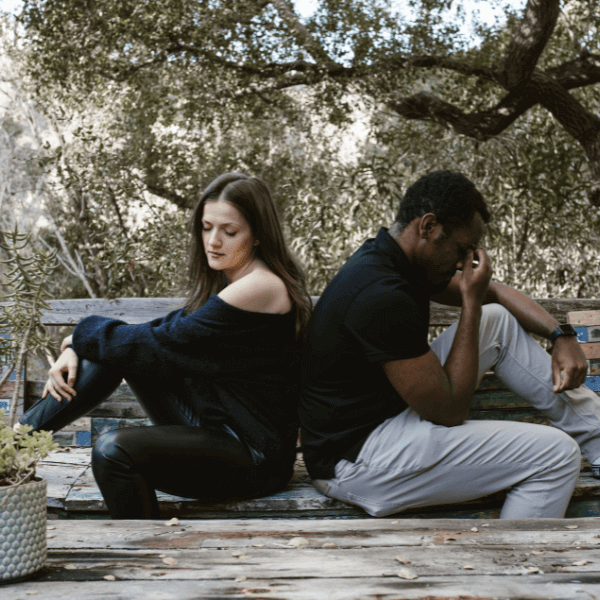Understanding Disrespect in Relationships
Relationships thrive on mutual respect, but things can hit a rough patch when that respect starts to slide. Let’s dig into what disrespect in relationships looks like and how it shows up in different guises.
Defining Disrespect in Relationships
Disrespect means acting in ways that chip away at someone’s dignity, independence, or value. It ain’t just about a little spat; we’re talking about actions that ignore boundaries, trash opinions, or make your partner feel small.
You’ve got the in-your-face disrespect, like name-calling or getting physical. But don’t sleep on those sneaky moves—condescending remarks or ignoring someone’s feelings can be just as damaging. Remember, respect is the bedrock of solid relationships. Any behavior that puts cracks in that foundation needs fixing to keep things on the up-and-up.
Forms of Disrespect in Relationships
Disrespect wears many hats in a relationship, each affecting the people involved differently. Check out these forms to spot the troublemakers and tackle them head-on.
Here’s a table showing common disrespectful behaviors in relationships:
| Form of Disrespect | What It Looks Like |
|---|---|
| Verbal Abuse | Throwing around hurtful words, insults, or derogatory comments. |
| Manipulative Behavior | Controlling or tricking your partner into things. |
| Disregarding Boundaries | Stepping over lines that have been set. |
| Lack of Empathy | Not getting or caring about what a partner feels. |
| Withholding Communication | Clamming up or avoiding honest talks. |
Spotting these behaviors helps folks see where they might be messing up. It gives ’em a chance to make changes for the better. By keeping an eye on respect, you can ditch those bad habits and build relationships that last, full of happiness and understanding.
Impact of Disrespect
Relationships take a hit when disrespect shows up to the party. It’s like uninvited drama, affecting folks emotionally and how they act, too.
Emotional Consequences
Got disrespect in your closest connections? Well, that kind of thing can mess with your head; think hurt feelings, simmering anger, gloominess, and even the dreaded inadequacy vibes. When someone keeps pulling the disrespect card, it chips away at self-esteem and rattles confidence big-time. What’s left is a mess—a shaky foundation for trust that can plunge someone into anxiety or depression.
It’s super important to handle these emotional wreckages head-on before they level your mental and emotional health. Chatting with a therapist or counselor can be a game-changer, helping folks wrangle those emotions and find better ways to roll with life’s punches. Want to know more about getting some support? Check out our scoop on individual therapy.
Behavioral Patterns
Disrespect ain’t just a bruiser on the emotional front—it throws people’s behavior into a tailspin, too. You might see some knee-jerk reactions, like clamming up, flying off the handle, or getting all cryptic and passive-aggressive. Those behaviors can snowball, making the relationship a breeding ground for misunderstandings and spats.
Spotting and tweaking these behavior quirks is key to stopping this madness and breathing life into the relationship. Communication’s a biggie here; think active listening and speaking your truth—laying down boundaries calmly can defuse those disrespect-triggered blow-ups. For a treasure trove of pointers on playing it cool with communication, have a gander at our take on lack of communication in relationships.
Getting wise to how disrespect tangles up emotions and actions can steer folks toward making things right and nurturing a relationship that’s dripping with respect. Put empathy, open dialogue, and mutual respect in the spotlight to transform the relationship into a fortress built on trust and understanding.
Breaking the Cycle of Disrespect
To tackle and overcome recurring disrespect in relationships, we need to zero in on clear communication and setting boundaries that encourage healthy dialogue and mutual respect.
Communication Strategies
Communication is the backbone of any strong relationship, right? When disrespect rears its ugly head, opening up and chatting honestly can help sort things out and build a bridge of understanding between both sides. We’re talking about listening to each other’s viewpoints, saying what’s on your mind without beating around the bush, and working together to sort things out.
Give some of these a whirl: use “I” statements to spill your feelings without pointing fingers, really listen to what the other person’s saying without jumping in, and show you get where they’re coming from. Jump on issues as they pop up—don’t let ’em sit and fester. That’s just asking for resentment and misunderstandings.
| Communication Strategy | What It’s About |
|---|---|
| “I” Statements | Share feelings and thoughts without blaming the other person. |
| Active Listening | Tune in to the speaker, acknowledge their emotions, and have a fitting reply. |
| Understanding | Try to get where the other one’s coming from to talk things out more effectively. |
Want more on talking things over? Check out our piece on lack of communication in relationships.
Setting Boundaries
Laying down clear boundaries can be a game-changer in heading off and dealing with disrespect. Boundaries spell out what’s cool and what’s not, including personal space and emotional needs, ensuring everyone feels safe and respected. By setting these lines, you look after your own well-being and keep the relationship running smoothly.
When laying down boundaries, make sure you’re open and firm. They should be clear, regular, and respectful of everyone’s feelings. Stay on top of these boundaries and nip any oversteps in the bud to keep trust and respect flowing.
| Boundary Setting Strategy | What It’s About |
|---|---|
| Clear Communication | Spell out your boundaries and expectations so everyone gets the picture. |
| Consistency | Stick with your boundaries and deal with any breaches fast to keep respect intact. |
| Respectful Assertiveness | Defend your limits respectfully and firmly for your own peace of mind. |
Looking for more on setting healthy boundaries? Check out our article on codependency in relationships.
By embracing open chats and defining your boundaries, you can ditch the cycle of disrespect and nurture relationships grounded in respect and understanding.
Growing Respect
When it comes to relationships, growing a sense of respect is like planting seeds for a blossoming bond. Here’s a look into why giving respect and understanding through trust and empathy is key to making relationships work like a dream.
Sharing Respect in Relationships
Respect is where the magic begins in any bond. Seeing and honoring what makes your partner tick, from their thoughts to their quirks, is part of the package. A respectful relationship is where both folks feel seen, heard, and valued for their true selves.
To get there, it’s about talking openly, really tuning into each other, and meeting halfway when needed. It’s about creating a zone where both can speak their mind freely, without the fear of being mocked or dismissed. With respect and understanding as the norm, even the toughest squabbles can be settled peacefully, helping the relationship to grow stronger.
Trust and Empathy: Heart of the Matter
Trust and empathy are the secret sauce to a relationship that respects and thrives. Trust isn’t just a word; it’s built on being real, reliable, and showing up consistently. When partners trust, they can relax knowing their relationship is steady and strong.
Empathy’s about feeling what the other person feels. With empathy, partners can bond deeper, chat better, and get closer. It means stepping into each other’s shoes, offering a dose of kindness and understanding.
| Key Elements | What It Means |
|---|---|
| Communication | It’s all about being open, honest, and keeping judgment out the door. |
| Boundaries | Knowing where to draw the line helps keep things healthy. |
| Listening | Tuning into what your partner is saying makes empathy happen. |
| Validation | Recognizing each other’s feelings builds a bridge of trust. |
Focusing on respect, trust, and empathy helps create a safe, kind-hearted space where both partners feel like a million bucks. These qualities are the building blocks for a strong relationship that weathers any storm and helps both people bloom. Curious about what might throw a wrench in your relationships? Check out our deep dive on toxic behaviors in relationships.
Self-Reflection and Awareness
Let’s talk about the power of self-snooping to halt those sneaky disrespect habits that can mess up any good relationship. This involves a good ol’ stare down with yourself to understand what makes you tick and what sets off those behavior fireworks.
Examining Personal Behavior
Stopping disrespect in its tracks isn’t about wagging fingers at others—it’s a personal mission. Peek into your own actions; it’s a bit like checking a movie reel of your life. Spot those ‘oops’ moments where you might’ve stepped on someone’s toes without even knowing. Think about past run-ins—did a hasty comment or a sarcastic jab leave someone feeling crummy? The idea is to face these moments with honesty.
Feedback’s not just for customer surveys; ask your close-knit crew how you come across. Does your joke sometimes hit like a comet instead of a shooting star? These nuggets of truth from trusted friends can shed light on hidden mannerisms and might push you to pivot in the right direction.
Recognizing Triggers and Patterns
Spotting what flips your switch—and by that, I mean, identifying those heat-of-the-moment scenarios—is key for keeping peace at the home front. Maybe a rough day turns you snippy fast, or a nagging comment that sneaks into the argument arena. Knowing these triggers helps you turn them down before they turn you up.
Also, grab a magnifying glass on those consistent disrespect patterns. Is it the way voices rise during dinner disputes or the nit-picking over planning chores? Getting these on your radar can arm you with ways to ditch those bad habits.
Getting the right amount of self-awareness can transform bickering into bonding. Dive a bit deeper into your habits, recognize what lights your fuse, and eye those redundant loops of behavior. That’s how you build respect and understanding in your relationships. Need more tips on breaking free from sticky relationship webs? Our article on codependency in relationships is a goldmine for steering towards more balanced interactions.
Seeking Support and Guidance
When folks encounter disrespect in their relationships, it’s super helpful to find some support and advice. Getting some relationship counseling or diving into personal therapy can do wonders for sorting out those tough spots and encouraging better, more respectful bonds.
Relationship Counseling
Think of relationship counseling like a referee with a twist; it’s not about who wins but about making the game enjoyable and fair. This form of therapy, sometimes dubbed couples therapy, gives partners a chance to hash things out with a pro guiding them. In this space, folks can speak up, dig into the core of their issues, and brainstorm ways to smoothen their interaction.
The game plan in relationship counseling is all about getting on the same page—seeing things from your partner’s lens, chatting more clearly, and forging stronger connections. With exercises and chats, couples dive into what’s been bugging them, set some boundaries, and unravel better ways to handle disputes.
Just because someone decided to give relationship counseling a shot doesn’t mean they’re raising the white flag. Far from it! It’s about showing you’re in it to win it, ready to learn and understand together. Putting in the effort here can shed light on what works, boost talks, and strengthen the bond. If stuff like codependency or gaslighting pops up, a word with a professional could be a good idea.
Individual Therapy
Jumping into individual therapy is like having a heart-to-heart with yourself, with a little help from someone who knows their stuff. It’s a safe nook to mull over personal ups and downs and work towards feeling better overall. When respect vanishes in a relationship, this one-on-one space can help in figuring out what’s going on, understanding reactions, and finding out what makes them tick.
Therapists act like guides in this journey, working with peeps to pinpoint deep-seated beliefs and patterns that might lead to disrespect or accepting it from others. Using stuff like cognitive-behavioral techniques, folks can deal with old hurts, learn better ways to handle stress, and build esteem and confidence.
Getting involved in therapy isn’t just about a quick fix but focusing on individual development, personal insights, and healing those emotional bruises. This can do wonders for both personal tranquility and the quality of relationships. Wrapping their heads around toxic behaviors and lack of communication can be crucial stepping stones in therapy.
Whether it’s relationship counseling or individual therapy, both offer heartfelt paths to overcoming disrespect in relationships. Tapping into this kind of help can mean the world, aiding in the dismantling of bad habits, nurturing respect, and building joyful relationships.





